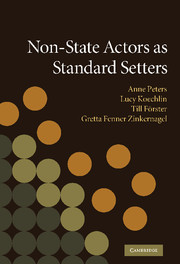Book contents
- Frontmatter
- Contents
- List of figures
- List of tables
- List of contributors
- Acknowledgements
- List of abbreviations
- Preface
- 1 Non-state actors as standard setters: framing the issue in an interdisciplinary fashion
- PART I New actors and processes in contemporary standard setting
- PART II The legitimacy and accountability of actors and standards
- 8 Democratic governance beyond the state: the legitimacy of non-state actors as standard setters
- 9 Legitimacy, accountability and polycentric regulation: dilemmas, trilemmas and organisational response
- 10 Accountability of transnational actors: is there scope for cross-sector principles?
- 11 Non-state environmental standards as a substitute for state regulation?
- 12 Limiting violence – culture and the constitution of public norms: with a case study from a stateless area
- PART III The authority and effectiveness of actors and standards
- Index
- References
12 - Limiting violence – culture and the constitution of public norms: with a case study from a stateless area
from PART II - The legitimacy and accountability of actors and standards
Published online by Cambridge University Press: 06 January 2010
- Frontmatter
- Contents
- List of figures
- List of tables
- List of contributors
- Acknowledgements
- List of abbreviations
- Preface
- 1 Non-state actors as standard setters: framing the issue in an interdisciplinary fashion
- PART I New actors and processes in contemporary standard setting
- PART II The legitimacy and accountability of actors and standards
- 8 Democratic governance beyond the state: the legitimacy of non-state actors as standard setters
- 9 Legitimacy, accountability and polycentric regulation: dilemmas, trilemmas and organisational response
- 10 Accountability of transnational actors: is there scope for cross-sector principles?
- 11 Non-state environmental standards as a substitute for state regulation?
- 12 Limiting violence – culture and the constitution of public norms: with a case study from a stateless area
- PART III The authority and effectiveness of actors and standards
- Index
- References
Summary
Introduction: statehood beyond the state?
From a Western perspective, the presence of the state as the dominant actor that sets or at least influences the setting of standards is often taken for granted – despite the recent shift to non-state actors in processes of standard setting addressed in this book. However, if one looks beyond the familiar realm of states that follow more or less the Westphalian model, it becomes apparent that in many regions, the state actually never had the authority that it seems to lose today in other parts of the world. In some cases, entire countries fall under this category. Somalia and a few other, mainly African countries are probably the best known examples. In other cases, it is a certain area within a country where the state has always been a somewhat ephemeral phenomenon. Such areas exist in many countries outside what is usually called the North. For instance, the outlying northern parts of the Sahelian countries have never been fully controlled by the colonial powers nor by the post-colonial state. These areas, however, are not characterised by a power vacuum; on the contrary, the long struggles for domination have led to a particular situation that is often characterised as ‘precarious statehood’ or as ‘para-statehood’, replacing the blunt and undifferentiated notion of the ‘failed’ or ‘collapsed states’.
- Type
- Chapter
- Information
- Non-State Actors as Standard Setters , pp. 324 - 348Publisher: Cambridge University PressPrint publication year: 2009
References
- 11
- Cited by



